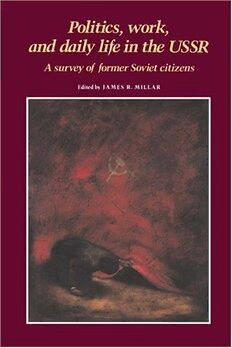
Politics, Work, and Daily Life in the USSR: A Survey of Former Soviet Citizens PDF
438 Pages·1987·13.036 MB·English
Most books are stored in the elastic cloud where traffic is expensive. For this reason, we have a limit on daily download.
Preview Politics, Work, and Daily Life in the USSR: A Survey of Former Soviet Citizens
Description:
Based on the first comprehensive study of life in the USSR since the Harvard Project some 33 years ago, Politics, Work, and Daily Life in the USSR is designed to illustrate how the Soviet social system really works and how the Soviet people cope with it. Taken as a whole, the book describes the sources of support and alienation in the Soviet urban population during the late 1970s, discussing such issues as Soviet political beliefs, ethnic relations, economic inequality, quality of life, and perceptions of social status. The essays contained analyze the variations in attitudes and behavior reflected in the findings of the Soviet Interview Project, a 5-year, 7.5 million investigation of contemporary daily life in the USSR. Among these findings, generational differences and differential education attainment are found to be the most significant underlying determinants of the opinions on, and approaches to, the different issues; the young, the educated and the well-paid, that is, the "best and the brightest" of Soviet society, prove to be the most critical and least satisfied with life in the Soviet Union. This comprehensive investigation involved interviewing thousands of recent emigrants from the USSR to the United States as a means of learning about their former day-to-day living. These individuals provided for a large volume of first-hand reports. Some aspects of this survey dealt with areas the Soviets themselves had never investigated, so the data were not, and still are not, available even in unpublished Soviet sources.
See more
The list of books you might like
Most books are stored in the elastic cloud where traffic is expensive. For this reason, we have a limit on daily download.
